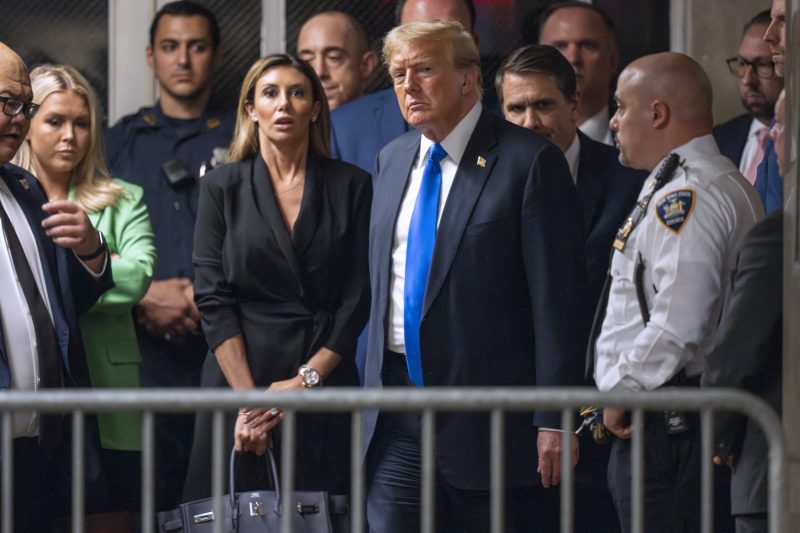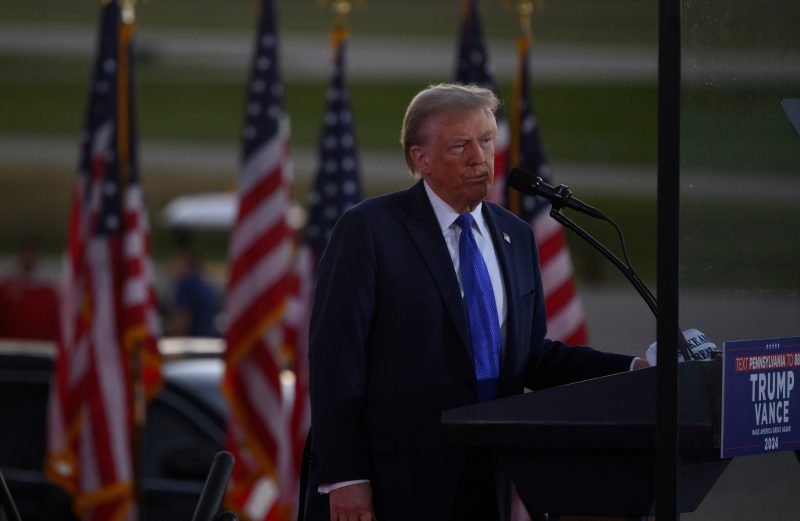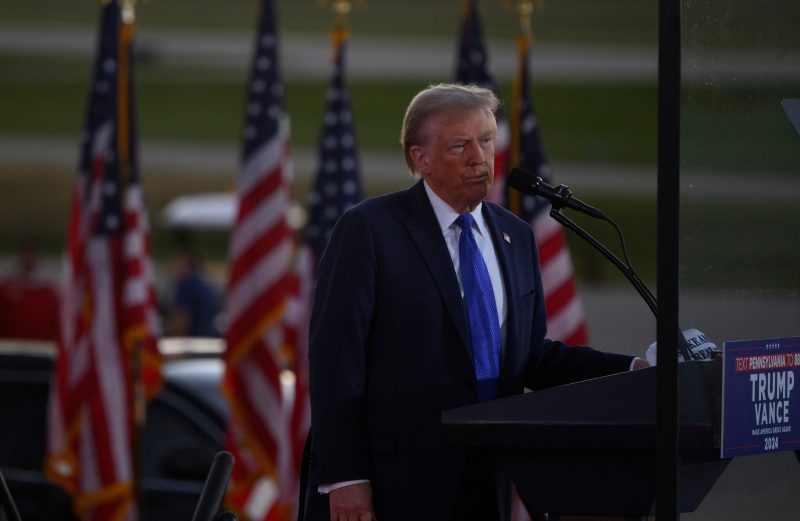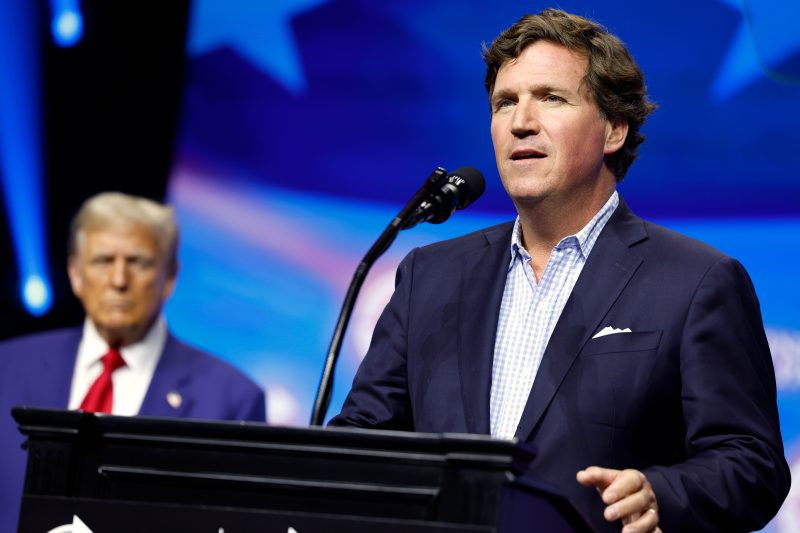
A ‘very innocent man’ stares down being convicted and becoming a felon
NEW YORK — Around 4:15 p.m. Thursday, Donald Trump strode into a Manhattan courtroom, looking cheerful with his usual entourage of lawyers and advisers as he took his seat at the defense table. The judge said he would soon dismiss the jury for the day, and Trump sat whispering, smiling and laughing with attorney Todd Blanche, seemingly enjoying himself.
Then the judge revealed that the jury didn’t want to go home: They had reached a verdict, they just needed a few more minutes to finish filling out the lengthy form with all 34 counts. Instantly Trump’s demeanor changed: He crossed his arms, knitted his brow, puckered his lips, and prepared for judgment.
The sudden turnabout made for a dramatic end to the seven-week criminal trial that stands to define the current campaign and this entire chapter in American history, at once making Trump the first former president convicted of a crime andthe first presumptive major party nominee running as a felon. In their immediate responses to the verdict, both Trump and President Biden’s campaign agreed that the ultimate conclusion would be rendered by this November’s election.
“It’s okay, I’m fighting for our country,” Trump told reporters in the courthouse hallway immediately after the verdict. “We’ll fight till the end and we’ll win.”
Trump was already centering his campaign on fighting this prosecution for hush money payments before the 2016 election as well as three other criminal indictments that accuse him of mishandling classified documents and trying to overturn his 2020 electoral loss. It is not clear whether any of those other cases will go to trial before the November election.
Still, the emphasis on Trump’s prosecutions is certain to intensify with Thursday’s verdict, as Trump advisers indicated the campaign will seek to portray him as a martyr to energize his supporters — and run against the Department of Justice and the legal system.
One person close to Trump said the trial would only make him more determined to win in November, and some of his advisers believed it would only harden the intensity of his core supporters.
“He’s a 34-time convicted felon now,” said this person, who like others in this article spoke on the condition of anonymity to discuss private conversations or campaign operations. “He knows he has to win.”
Another person close to Trump wrote: “Trump is now running for his freedom. Watch out!!”
The campaign quickly responded to the verdict with a fundraising solicitation that declared, “I’M A POLITICAL PRISONER!” — adapting the term that Trump has been using to describe his supporters charged in the Jan. 6, 2021, attack on the U.S. Capitol.
The advisers said the verdict produced a spike in campaign contributions. WinRed, the main website that Republicans use for online fundraising, temporarily produced error messages for some users. Campaign spokesman Brian Hughes said the site received “record” traffic, causing “intermittent delays.” Adviser Chris LaCivita encouraged supporters to try again.
The conviction’s shadow over the campaign is also poised to grow as the Biden side breaks its silence on the case. Throughout the trial, the White House and the campaign avoided directly commenting on the prosecution, out of sensitivity to Trump’s claim, without evidence, that the Manhattan district attorney brought the charges at Biden’s direction. Biden, who has grown angry at the Justice Department himself for its handling of his classified documents and his son’s legal cases, wanted to respect the traditional independence of the Justice Department, advisers say.
Now that a jury has found Trump guilty, however, the Biden campaign signaled it would not be shy about highlighting that judgment for voters.
“Today’s verdict does not change the fact that the American people face a simple reality. There is still only one way to keep Donald Trump out of the Oval Office: at the ballot box,” Biden spokesman Michael Tyler said. “He is running an increasingly unhinged campaign of revenge and retribution.”
With both campaigns and both parties already so hardened in their views of Trump and the case, some analysts were quick to discount the outcome’s effect on voters.
“The message from the campaign is, what did you expect from a New York City jury?” said David Urban, a longtime Trump ally. “If anything, I think it pisses Republicans off who say ‘enough already.’ That is the point we’re at.”
The Trumpcampaign is seeking to turn the verdict into a factor that hardens the intensity of his supporters, while they try to convince independents and even some Democrats that the justice system is being used unfairly against him. The former president, people close to him say, loves playing the role of the martyr or the victim. He often talks at fundraisers and rallies about the cases, saying they are only helping his poll numbers.
Trump spent Thursday evening at a fundraiser, according to a campaign officer, and the former president said he will speak publicly again at a news conference on Friday morning. His campaign sought to preempt the verdict on Thursday with a polling memo saying they had surveyed voters on the potential conviction and it wasn’t significant in key battleground states, nor was a potential acquittal. The memo said majorities of voters viewed the trial as politically motivated and weren’t following it closely.
“Yes, this is a big deal, and yes, this is unknown territory, but we’ve been through a lot of big deals and unknown territories with Donald Trump over the last decade and they end up not being a big deal,” Republican strategist Terry Sullivan said. “Anybody who predicts this is the end of him hasn’t been paying attention, and he often is really good at turning stuff like this into a positive and all of his messaging has been the system is rigged, they’re trying to keep me from being your nominee, and this kind of plays into that narrative”
Republican politicians rushed to Trump’s defense, with Sen. Tim Scott (R-S.C.) calling it “un-friggin’-believable” in an online video, and Sen. Lindsey Graham (R-S.C.) warning, “It will be seen as politically motivated and unfair, and it will backfire tremendously on the political Left.”
Presidential historian Douglas Brinkley called the Republican embrace of Trump’s conviction and turn against the legal process “staggering.”
“A group of New York jurors deliberated and were able to contemplate right from wrong,” Brinkley said. “It’s a great moment for the founders of our republic, because they created a checks and balance system and the judicial branch still works.”
Trump’s own instantaneous reaction to the first “guilty” count is lost to history. The reporters in the courtroom were behind him, unable to see his face. The reporters watching on a closed-circuit video feed in the next room lost the signal at the moment the counts were being read. By the time video showing Trump’s face returned, as he proceeded to be convicted on all counts, he was sitting solemnly, slightly slumped in his chair, blinking blankly, and frowning.
He looked at the jury while they each individually affirmed that this was their verdict, and then they filed out past him, avoiding his gaze while he avoided theirs. Blanche rubbed his face and ran his hand through his hair, then asked the judge, Juan Merchan, to throw out the verdict. Trump leaned back in his chair, rolling his eyes back to look up at Blanche standing, then down at the table in front of him. Merchan declined to dismiss the verdict and set sentencing for July 11, a week before Trump is set to formally accept the Republican nomination.
Trump appeared flushed as he walked out grimacing. He stopped just outside the courtroom doors to huddle with his aides, including Jason Miller, Steven Cheung, Karoline Leavitt and Boris Epshteyn. Then he approached the stakeout camera set up in the hallway to address reporters, as he did throughout the trial.
His words were similar: criticizing the judge, the venue, the prosecutors. But this time he held his head a little lower, hissed a little more on the word “disgrace,” spat a little more as he repeated the word “rigged.”
“I’m a very innocent man,” he insisted.
Trump had spent the trial trying to stay positive, making jokes at his New York penthouse with guests, attending high-dollar fundraisers across the country and participating in campaign strategy meetings. He has been privately telling people that his poll numbers will go up, but the experience of being in the courthouse is “miserable,” Trump has said, according to an adviser, and he is ready to return to Florida.
“There’s never been a president abused like me,” Trump told donors at a private event last week, comparing his treatment to Andrew Jackson and Abraham Lincoln.
During the course of the trial, he occasionally expressed frustration with his lawyers, particularly Blanche, but he seemed to brighten on him after his aggressive cross-examination of Michael Cohen. He often grew personally involved in legal arguments and elements of his defense — even as he appeared to sleep at other times.
In private, Trump had often expressed surprise at being charged with felonies. “Can you believe it?” he has asked advisers. “I’m charged with felonies. Can you believe it?”
Afterward, though, even as he told others the verdict was not surprising, he faced a fact he dreaded: He was now a felon.



